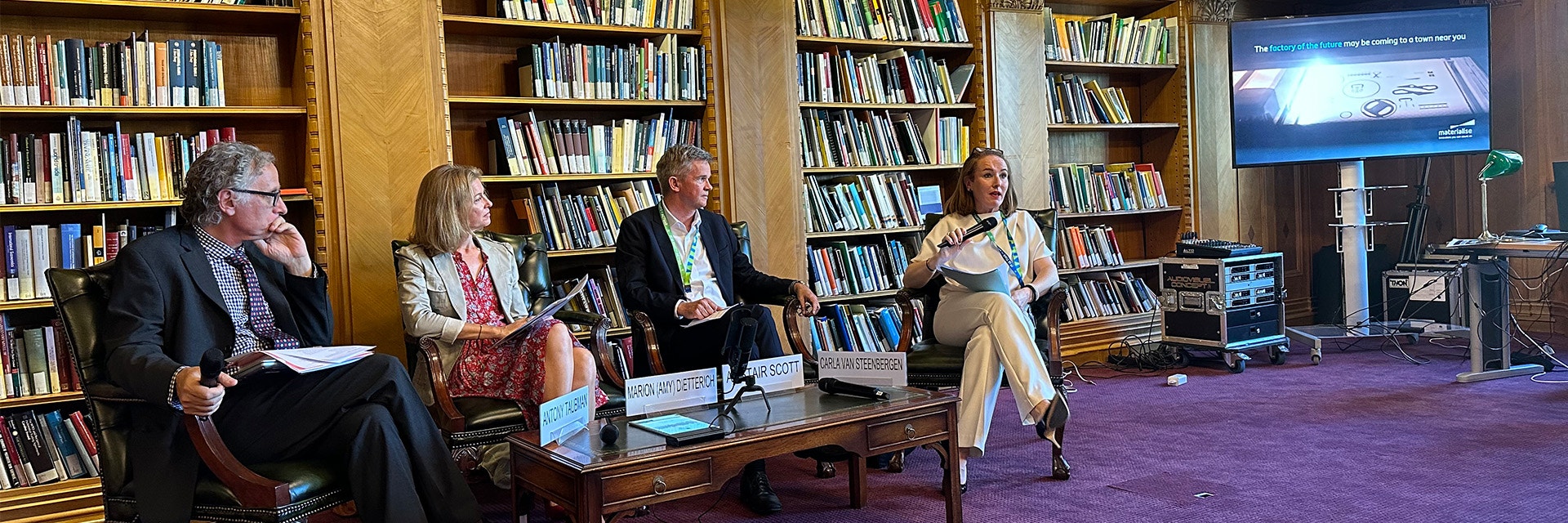EXPERT INSIGHT
The Dawn of Decentralized Manufacturing: Navigating Challenges and Seizing Opportunities
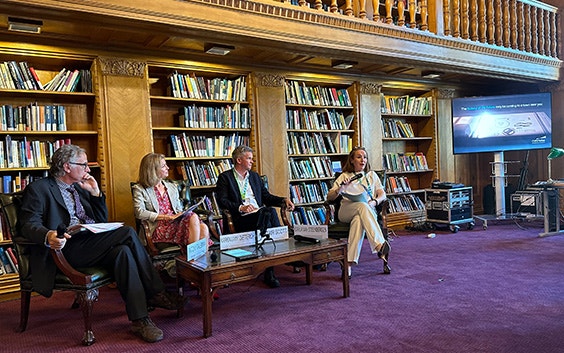
Carla Van Steenbergen, Chief Legal Officer at Materialise, recently participated in a panel discussion at the 2023 Public Forum organized by the World Trade Organization (WTO). With 3,400 attendees, this forum is a significant global platform dedicated to exploring how trade can drive a greener and more sustainable future. Read her thoughts on the event and the role of technologies like 3D printing in achieving that goal.
The session I was part of included companies like Airbus and was titled “Exploring IP's role in pushing the needle on green, digital technology and trade.” During my presentation, I outlined how smart digital technologies — like 3D printing — are creating a mind-shift in manufacturing. This shift to a smaller, distributed manufacturing environment brings economic and social advantages as well as opportunities. But it also presents new challenges.
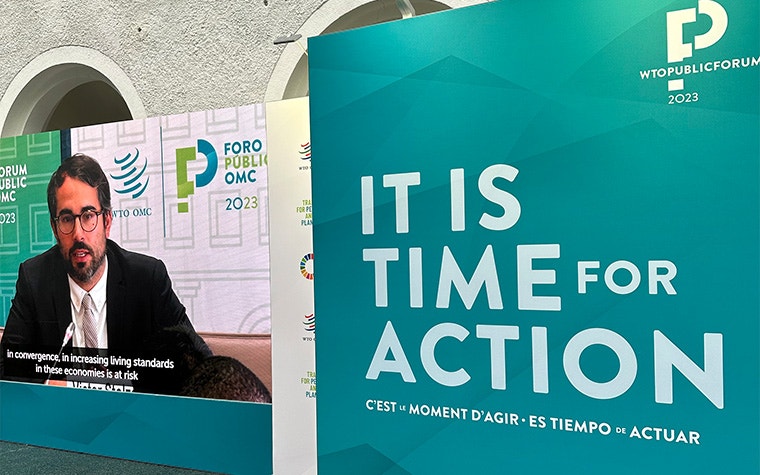

A shifting mindset
In an era defined by competition, supply chain volatility, sustainability imperatives, and geopolitical complexities, businesses are embracing a paradigm shift in their manufacturing strategies. The convergence of these factors has given rise to a new era of production, where traditional manufacturing powerhouses are no longer the sole players. The factory of the future is not a monolithic entity but rather a network of interconnected, smaller-scale facilities located in close proximity.
The distributed manufacturing revolution, characterized by smaller-scale and nimble production facilities, has been a subject of speculation for years. Recent events, from the COVID-19 pandemic to regulatory drives for carbon emission reduction, have given this concept traction. Powered by advanced technologies and facilitated by the accessibility of localized production, this shift is reshaping the industrial landscape.
Its transformation is underpinned by smart digital technologies that are not only challenging conventional manufacturing methods but also steering the industry toward greater sustainability. At the forefront of this transformation, 3D printing has emerged as a game-changer that seamlessly aligns with this metamorphosis.
The role of 3D printing
3D printing, an exemplar of digital manufacturing, introduces a new paradigm. With the ability to fabricate products rapidly and in smaller batches, it seamlessly integrates into the ethos of nearshoring and decentralization. Its virtues extend to efficient adaptation from large overseas factories to flexible local plants, enhancing supply chain resilience and response times. Furthermore, 3D printing's hallmark of on-demand production and customization addresses sustainability imperatives by reducing waste, contributing to a circular economy, and mass-personalizing products.
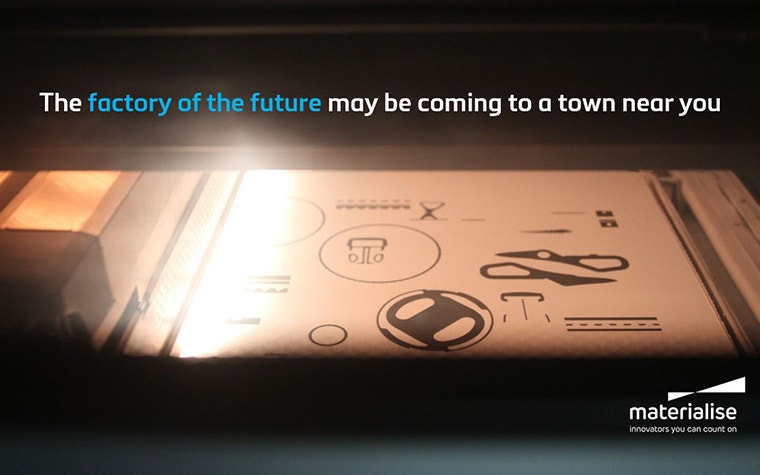

However, as we embrace this promising manufacturing transformation, it's crucial to acknowledge and address the challenges that accompany it.
The first challenge is the human factor. The ascendancy of digital manufacturing technologies does not relegate human expertise to the sidelines. Instead, it emphasizes the synergy between technology and human creativity. A skilled workforce is essential to harness the full potential of these technologies, to innovate, and to provide the intuition that machines lack. Training and upskilling are paramount to capitalize on this transformative wave.
The sustainability question follows closely. Labeling a technology as sustainable is not enough; we must go beyond and ask how we can make it more sustainable. Whether it's electric cars or 3D printing, the journey toward true sustainability necessitates innovation, conscious choices, and consistent efforts to mitigate environmental impact. Sustainability must be pursued in tandem with technological advancement.
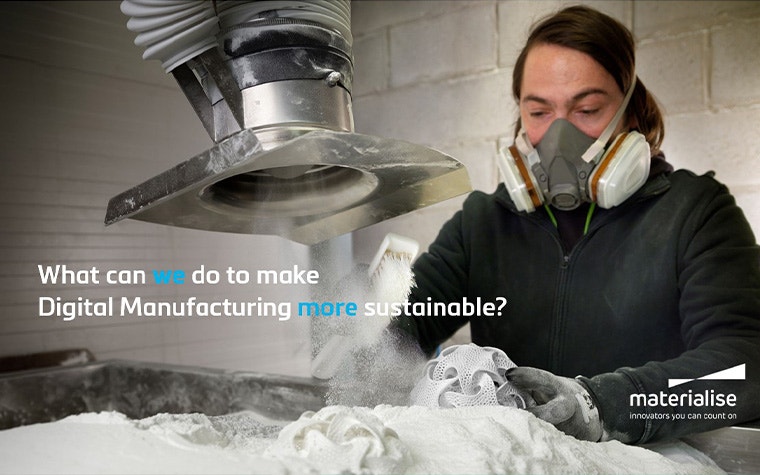

Additionally, the shift towards distributed manufacturing hinges on data sharing, which brings forth the challenge of data ownership. While sharing data across a network of partners enhances processes and designs, safeguarding intellectual property remains paramount. Striking a balance between collaborative innovation and protecting competitive advantage is a delicate task. The preservation of data integrity and security must underpin any collaborative endeavor.
As industries embark on the transformative journey of decentralized manufacturing, they must embrace these challenges as catalysts for innovation. Training the workforce, making technologies sustainable through innovation, and fostering secure data-sharing practices will pave the way for a more agile, resilient, and sustainable manufacturing ecosystem. While there's no doubt that the path ahead is complex, the rewards are substantial — from localized economic growth to reduced environmental impact.
The new era of manufacturing promises a departure from the "Factory of the World" archetype. It's an era where proximity to customers matters, customization thrives, and collaboration shapes progress. The promise of a more reliable, sustainable, and efficient supply chain is on the horizon. But to fully realize this vision, companies and industries must work hand in hand to overcome challenges and seize the potential of a distributed manufacturing future.
Share on:

Meet the author
Carla Van Steenbergen
You might also like
Never miss a story like this. Get curated content delivered straight to your inbox.
